One Year of Duterte Presidency: Deeper Issues and Challenges
CenPEG News
July 21, 2017
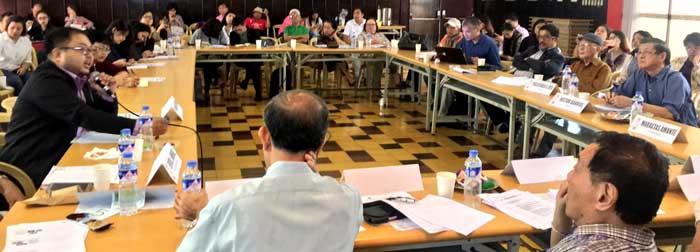
CenPEG’s 9th State of the Presidency
Four days ahead of President Duterte’s second State of the Nation Address (SONA), CenPEG Fellows appraised the presidential performance based on issues and challenges during Duterte’s first year – July 2016 to June 2017. In a public forum organized by CenPEG on July 20, 2017, the CenPEG Fellows assessed the presidential performance covering issues on governance leadership, economic directions, foreign policy, government peace talks with the Left, the Bangsamoro peace road and Marawi crisis, and the war on illegal drugs.
CenPEG’s 9th State of the Presidency (SOP) public forum, Looking Ahead at the Duterte Presidency: Policy Issues and Directions, was held in cooperation with the Office of the Dean, School of Labor and Industrial Relations (SOLAIR), in the University of the Philippines, Diliman, Quezon City.
Dr. Temario C. Rivera, CenPEG chair and Senior Fellow, talked on “Duterte’s Leadership and the Promise of Change: A Populist-Authoritarian Reform Agenda?” where he described Duterte “as arguably the most willful president the country has had in the last 30 years”. Duterte, Rivera said, “has pursued relentlessly a bloody campaign against illegal drugs and criminality oblivious of the domestic and international outcries against the rampant abuse of human rights and the extra-judicial killings that have attended this process.”
At the same time, the CenPEG chair raised major problems and challenges facing Duterte: “The president’s almost single-minded focus on the bloody, police-anchored campaign against illegal drugs and criminality (that) has sidelined pressing reforms in the economy to address severe problems of unemployment and poverty, land reform and industrialization, and the delivery of urgent social services especially of public health, housing, education, and mass transport.” Duterte’s authoritarian leadership style,” Rivera added, “promotes a culture of impunity among public officials and sidetracks the need to strengthen public institutions. The Marawi crisis is a jolting wake-up call for the urgency of reforms in the long neglected Mindanao provinces and a negotiated peace agreement with both the Muslim rebels and communist-led armed movement.”
Dr. Joseph Anthony Lim, in his presentation “Understanding Duternomics,” said it is “high time the government paid serious attention to regional disparities and highly-skewed income distribution” within urban and rural areas, and between urban and rural areas. This requires, the Ateneo economics professor said, key infrastructures for economic and social services “be built in poor areas, and local economies in backward areas jumpstarted to provide quality jobs and skills tor rural and low-income folks.”
While pursuing the old neo-liberal economic policies of previous administrations, President Duterte, Lim said, does not see economic deprivations as a “a strong contributor to social problems: criminality, drugs, youth recruitment to terrorist groups, social anomie, dysfunctional families.” Thus, he said, the focus on solving economic and social deprivation “is very weak, compared to the focus on force and vigilantism in the anti-drug war and the war against terrorism. The solutions to economic and social (health, education, welfare) problems are wanting.”
In his talk, Prof. Julkipli Wadi, said the Marawi crisis in southern Philippines “is the single, most devastating challenge that impacted heavily on the first year of the Duterte administration.” The problem, the former Dean of the UP Institute of Islamic Studies and CenPEG Fellow said, could have been averted “had there been clear and coherent policy and strategy” of the government. With the Marawi war dragging for more than a month now, Wadi said, “it is a question how the armed forces end its war with a nemesis (Maute Group, Abu Sayyaf, and ISIS affiliates) that it previously underestimated as not too threatening enough while government remains oblivious of doing comprehensive de-radicalization efforts on Moro youth.”
“Making government’s war on Muslim radicalism hinges on the pace and development of the Bangsamoro peace process particularly the passing of new Bangsamoro Basic Law and how it is made to square with Duterte’s federalism project,” Wadi said. “The faster the steps of peace process take concrete forms with actual peace dividend… the easier it would be for government to create positive and more effective headway against radicalism and terrorism.”
“The underlying structural conditions of Moro rebellion and radicalism and their attendant geopolitical dimension have hardly changed; they, in fact, worsened in recent years,” Wadi said.
While Duterte wants an independent and balanced foreign policy – not leaning exclusively on the country’s traditional ally US – this remains to be seen. That qualification was pointed out by Prof. Roland G. Simbulan who talked on “Competing Perspectives and Forces on Philippine Foreign Policy and Security Relations During the 1st Year of President Duterte.” He said that one year after Duterte came to power, the country has still “a long string of existing security treaties and agreements in place with the United States…including the PH-US 1947 Military Advisory and Assistance Agreement, the 1951 PH-US Mutual Defense Treaty, the 1999 PH-US Visiting Forces Agreement, and the 2014 PH-US Enhanced Defense Cooperation Agreement.” These agreements, Simbulan, CenPEG Vice Chair said, have allowed U.S. troops “to establish their presence and other uses of our territory for their military purpose.”
Simbulan said Duterte extended “a hand of warm friendship with China and Russia” hoping that “they will reciprocate with gestures that will support our economy and development plans - in our industrialization, agriculture, and infrastructure.” But he posed the following issues to the Duterte administration: “Shall we abrogate these existing PH-US agreements to balance our relationship with other big powers like China and Russia? Shall we soften the defense of our territorial and maritime rights to gain economic trade, investment and other concessions with China? Or, shall we likewise forge similar security agreements with China and Russia?”
In the final analysis, Simbulan said, foreign policy will not be decided by external forces or interests but “by the dynamics of internal power play by key well-entrenched Philippine institutions…that determine the conservative and neoliberal economy, the pro-U.S. military establishment and, on the opposite end, the counter-force of progressive forces inside and outside of government that defend, and invoke Philippine constitutional provisions on national sovereignty and self-determination.”
Bobby M. Tuazon, CenPEG’s director for policy studies, said in a paper read on his behalf by forum moderator, Prof. Carl Marc Ramota, the atmosphere at the resumption of peace talks in Oslo upon the start of Duterte’s presidency last year sounded upbeat but has since turned contentious or been derailed by unresolved issues such as on the release of political prisoners, the trading of accusations regarding armed offensives, and so on. Tuazon said there are issues deeper than these such as the GPH principal’s poor appreciation of what a peace process is as well as the military and business influence in decision-making especially at the national level. Although there has been a consensus by both panels to move the talks forward – such as on free land distribution – and continue back-channel talks, “the key toward forging a peace agreement within the term of Duterte lies in how far the GPH principal can rein in the dominant players on its side and reach a level of perspective regarding the role of the peace process in institutional reforms thereby reaching a common ground with the NDFP for a just and lasting peace agreement.”
Dr. Reginaldo Pamugas from the Health Council on Human Rights said Duterte’s iron-fist approach to wiping out the illegal drugs industry in the country by targeting small-time drug users and pushers – victims, reports say, of widespread summary executions - will not work. In his talk, “Can President Duterte Win the Hearts and Minds of the Filipinos in the War on Drugs?” Pamugas described the illegal drug problem as a social and health issue whose solution lies in addressing its socio-economic roots. Pamugas also pushed for a strong neuroscientific research aimed at discovering new medications for drug abusers that will “substitute, block, or blunt” the effects of drug abuse.
The forum panel of reactors included Hector A. Barrios, CenPEG Fellow and systems analyst of AES Watch; Ateneo University’s Prof. Hansley Juliano; and Paolo Irineo A. Jose, senior student from UP Manila.
The 9th SOP opened with welcome remarks by SOLAIR’s Dean Ronahlee A. Asunsion followed by CenPEG Executive Director Evita L. Jimenez for the forum introduction.
Among other Fellows in the event were former CenPEG Board chair and National Artist, Bien Lumbera, Profs. Maragtas Amante, Felix Muga II, Fidel dela Torre, and Carl Marc Ramota who served as the forum moderator. Forum guest discussants included Profs. Roxanne Lim, Bernardita Churchill (emeritus professor), and Joe Tabbada, Bayan Muna Rep. Carlos Isagani Zarate, Vic David, Shayne Nograles-Lumbera, and Ibon Executive Director Jose Enrique Africa.
Assisting the forum secretariat were 14 practicum students from UP Manila. CenPEG News
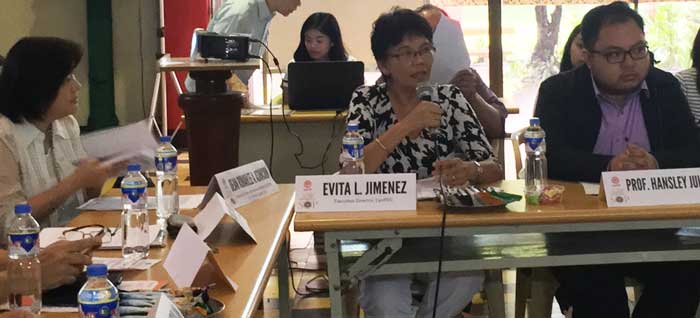
CenPEG Executive Director Evi Jimenez introduces the forum, with Dean Asuncion (left) and reactor Hansley Juliano (right)
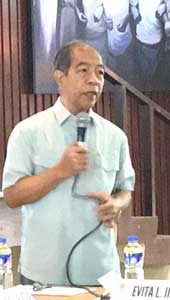
CenPEG Chair Temario Rivera
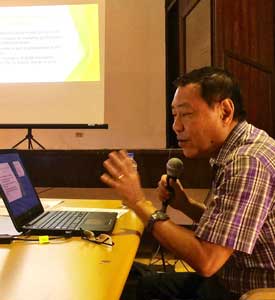
Joseph Anthony Lim
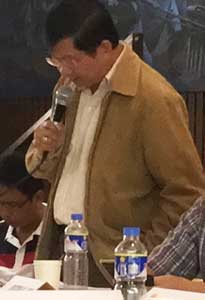
Roland G. Simbulan
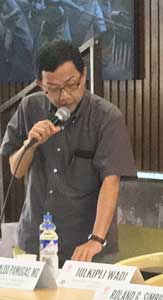
Julkipli Wadi
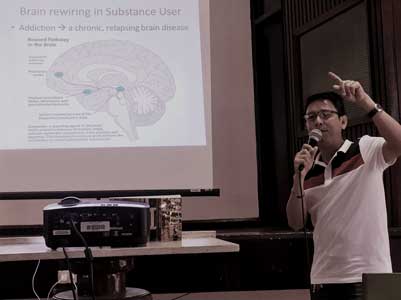
Regi Pamugas, MD
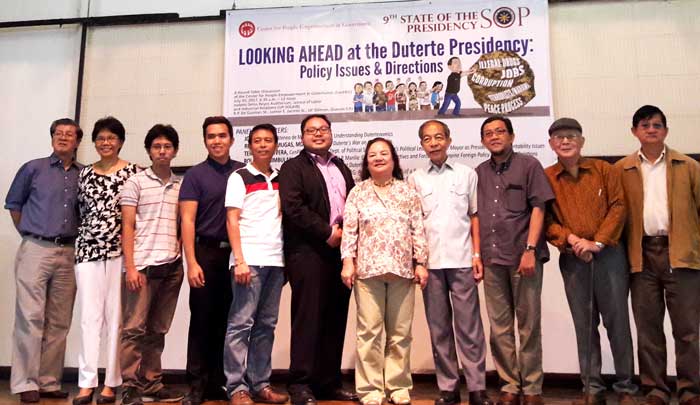
(L-R) Reactor Hector Barrios, Evi Jimenez, Paolo Irineo Jose, Regi Pamugas, Hansley Juliano, former Dean Georgina Encanto, Temy Rivera, Jul Wadi, Dr. Bien Lumbera, and Roland G. Simbulan
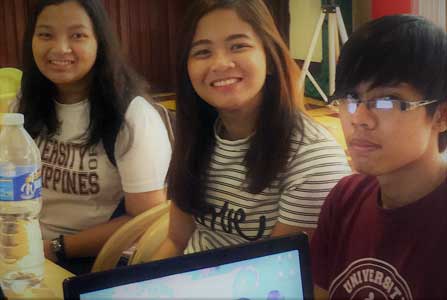
Secretariat volunteers (l-r) Adelaida Aninion, Tiara Gatchalian, and God Rick Espena
- Probing presidential platforms
- Conference calls for people-centered policy actions for Asian development and peace
- WWII 'comfort women' urge visiting Japanese emperor: OFFICIAL GOV’T APOLOGY, UPHOLD TRUTH, and JUST COMPENSATION
- FEARLESS FORECAST (EPISODE II): Comelec will not comply with e-Commerce Law in 2016 elections
- Fearless forecast: Comelec’s non-compliance with the AES law in 2016 (last of 2 parts)
- Fearless forecast: Comelec will not comply with the AES law in 2016
- CenPEG releases travelogue
- Experts: Nuisance bets reflect disillusionment, uneven playing field
- Partylist solon presses for tax cuts
- The True Cost of a Political Campaign
- Management decisions: Based on RA 9369 or purely Comelec’s?
- CenPEG holds 1st roundtable with media on presidential poll results
- Filipino IT can do it!
- FIT4E: The only transparent solution
- Realpolitik in the maritime tiff
- China’s challenge to PH sovereignty
- Choosing the next president
- Fixing the presidency, reforming the state
- New Comelec chair says he’s open to other election technologies
- SC ruling on AES Watch Pabillo and IBP vs Comelec, Smartmatic-TIM
- Comelec must explain P3.2B unliquidated cash advances
- CONGRESS ASKED TO HOLD DEMO ON PCOS HACKING
- 25 Bishops ask poll body to stop midnight deal with Smartmatic
- Pope Francis: reform and conversion
- 2 poll watch coalitions stage rally vs Comelec-Smartmatic midnight deal
- AES Watch questions Comelec-Smartmatic midnight deal
- ASEAN-India: Building Youth Partnerships through Culture and Entrepreneurship
- CenPEG forges research exchange and partnership with Jinan University
- FOI: Bearing fruit or foiled again?
- Remittance with Representation: The right to vote of overseas Filipinos
Center for People Empowewrment in Governance (CenPEG), Philippines. All rights reserved


